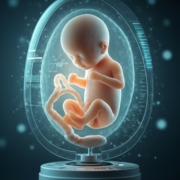bag babies?
Just as children conceived through IVF became known colloquially as ‘test-tube babies’, the work being carried out by scientists to create artificial wombs has been dubbed by a recent item in The Times as a quest to grow a ‘baby in a bag’.’
The piece didn’t really contain anything new except to say that only Generation Z (under-25s) gave much public support for such babies in a bag, and even that was at 42 per cent – hardly a ringing endorsement. It did, however, draw attention to the continuing advance of research into ectogestation (the growing of fetuses outside their mother’s womb for the later part of their development) and ectogenesis, where the aim is that following IVF, the entire gestation takes place outside the womb.
In 2017, Partridge et al. showed ‘extreme premature foetal lambs can be consistently supported in an extracorporeal device for up to 4 weeks without apparent physiologic derangement or organ failure.’ No mention is made of any behavioural effects in lambs, however, but there is plenty of evidence in human development that the in-utero environment has a powerful effect on both the psychological and physiological development of children. This being so, it will be vital to study in detail the importance of the effects of an ectogenesis environment on children brought to maturity by it. In principle, however, ectogestation can be viewed in relation to the child as an extension of existing neonatal care and could be lifesaving for extremely premature infants whose lives currently cannot be saved. Parents would surely be glad of this option for a precious premature child who would otherwise be unable to survive.
What, then, of the possibility of ectogenesis? If, theoretically, the necessary physiological environment could be offered for the whole span of pregnancy, should this be considered desirable by parents? What certainly cannot be replicated is the effect on the mother of the presence of the growing child within her in terms of both the control the mother has over the external influences to which the child is subjected and also the bonding the child induces during pregnancy well before birth. Though the beneficial effects of playing classical music to babies in utero are widely disputed, pregnant mothers do currently have a choice over what music their unborn children hear, whereas in an ectogenesis factory, choice in this and other environmental influences is not possible or, at best, restricted. In fact, ectogenesis would render all the current NHS advice on the importance of antenatal bonding to pregnant mothers completely redundant. Though the Bible does not speak directly about ectogenesis, the antenatal response felt by Elizabeth from her unborn son to the presence of Mary’s visit with the unborn Christ in her womb (Luke 1:41), indicates, at the very least, that mothers would miss out on a very important element of bonding with their child if the baby is in a bag for its entire gestation.
In any case, ectogenesis, at least in the minds of some of its more passionate advocates, has a very different focus from the child’s wellbeing and the mother’s bonding. It is a political issue about women’s equality rather than a child-centred concern. I once witnessed on BBC’s ‘Big Questions’, a bioethicist proclaiming that ectogenesis was an essential element for women’s equality in order to rid them of the burdens of pregnancy and giving birth. Should it become possible, Rodgers et al rightly note, ‘Ectogenesis is a natural extension of ART (Artificial Reproductive Technology) services, and the considerable funds that are currently directed towards paying surrogates can potentially be subsumed into the revenues of ART providers.’ Childbirth is sometimes framed as only a painful experience to be avoided if at all possible, perhaps part of the explanation for the increasing popularity of elective caesareans in many countries. Ectogenesis offers to remove the ‘burdens’ of both pregnancy and giving birth. Some feminists see ectogenesis as an essential step to bring about sexual equality in reproduction.
Yet one can also easily imagine the frequent scene of a newly pregnant mother being congratulated on her pregnancy and glowing with personal delight. The joy of pregnancy will be replicated all over the world today in many similar encounters. Perhaps pregnancy and childbirth provide better things than ‘reproductive equality’? The cycle of birth and death is universal in human experience, and birth is a very important biblical theme. The concept of birth is an essential prerequisite to understanding being ‘born again’, without which we cannot see the kingdom of God. (John 3:3) Perhaps even more pertinent is Jesus’ observation that, though childbirth is painful for the mother at the time, ‘when she has delivered the baby, she no longer remembers the anguish for joy that a child had been born into the world.’ (John 16:21) Growing a baby in a bag might offer to obviate the pain of labour (and the ‘burden’ of pregnancy), but might it also remove some of the corresponding joy?


